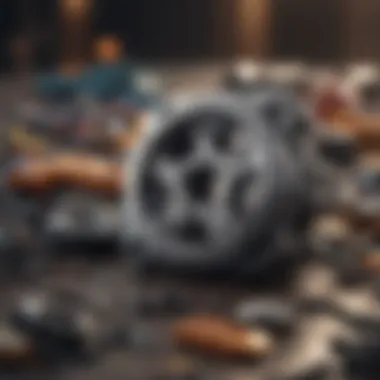Eco-Friendly Auto Recycling in Erie, PA


Overview of the Topic
Auto recycling represents a critical intersection of environmental stewardship and community engagement. In Erie, PA, the practice not only contributes to resource conservation but also helps mitigate waste through responsible vehicle disposal. With the increasing concerns about environmental sustainability, this topic gains importance as communities seek to reduce their ecological footprints and promote cleaner practices.
The significance of auto recycling in Erie lies in its ability to recover valuable materials from old and unusable vehicles. The process typically involves dismantling vehicles for parts, recycling metals, and ensuring hazardous materials are properly disposed of. This method not only conserves natural resources but also reduces landfill waste, thus contributing to a more sustainable future for the entire community.
Current Status and Challenges
In Erie, the auto recycling industry shows various trends and challenges. Currently, there is an increased awareness among residents regarding the need for sustainable practices. However, obstacles remain. Many recycling facilities in the area grapple with strict regulations, the cost of compliance, and the need for updated technology.
Key challenges include:
- Regulatory compliance: Adhering to local and federal environmental regulations is imperative. Facilities must ensure that they manage hazardous materials appropriately, which can be costly and time-consuming.
- Market fluctuations: The demand for recycled materials varies, impacting the profitability of recycling businesses. This unpredictability can discourage investment in more advanced recycling technologies.
- Community awareness: While some understand the benefits of auto recycling, many still lack knowledge about the process and its positive impact on the environment. Elevating this awareness is crucial.
Sustainable Solutions
To address the issues facing auto recycling in Erie, residents and businesses can adopt several sustainable practices. These include:
- Promotion of local recycling initiatives: Encouraging residents to utilize local recycling centers helps reduce transport emissions and promotes community involvement.
- Education and outreach programs: Schools and local organizations can implement programs to educate the public on the benefits and processes of auto recycling, fostering community participation.
- Investment in technology: Updating recycling techniques can enhance efficiency. Facilities that integrate advanced dismantling and processing technology can reduce waste and optimize resource recovery.
A successful example of effective resource management is the collaboration between local businesses and environmental organizations. Together, they create community events aimed at raising awareness and incentivizing responsible vehicle disposal.
Impact and Importance
The impact of auto recycling on ecosystems and communities is significant. Environmentally, it reduces pollution and conserves energy by repurposing existing materials, thus lessening the need for new raw materials. Economically, the practice supports local jobs and stimulates the economy through job creation in the recycling sector.
Furthermore, the importance of conservation efforts cannot be understated. By adopting sustainable resource uses, the community ensures a healthier environment for future generations. Protecting natural habitats and reducing waste will contribute to biodiversity preservation.
"By engaging in community auto recycling, Erie residents are not just cleaning their streets; they are investing in the future of their environment."
Ultimately, fostering a culture of sustainability within the realm of auto recycling is crucial. It requires collaboration among individuals, businesses, and local authorities to create a resilient community that values resource conservation and responsible environmental practices.
Preface to Auto Recycling in Erie, PA
Auto recycling has become a significant practice in Erie, Pennsylvania. This segment is vital in understanding how this industry operates and the role it plays within the community. Auto recycling not only addresses the growing demand for sustainable practices but also offers numerous environmental and economic benefits. Each recycled vehicle contributes to reducing landfill waste and conserving natural resources, which is crucial in today’s ecological landscape. Moreover, this practice fosters community engagement and encourages local initiatives aimed at sustainability.
Overview of the Auto Recycling Industry
The auto recycling industry encompasses a range of processes, including the dismantling of vehicles and the recovery of valuable materials. In Erie, this industry is characterized by its commitment to sustainability. A significant portion of discarded automobiles is processed here.
The primary steps in auto recycling include:
- Dismantling vehicles: This involves removing reusable parts like engines, transmissions, and tires.
- Processing materials: Metals, plastics, and other substances are sorted and prepared for reuse or recycling.
- Reusing or recycling parts: Functional components are sold or repurposed, minimizing waste.
Local recyclers follow regulations and industry best practices to ensure their operations are environmentally sound. Understanding these processes helps to appreciate the industry's contribution to the community and its ecological impact.
Importance of Community Involvement
Community involvement is crucial in auto recycling. In Erie, local residents play a pivotal role in promoting sustainable practices. Their participation is essential for raising awareness about the benefits of recycling vehicles. Educational initiatives aim to inform community members about how auto recycling works and its environmental significance.
Key factors illustrating the importance of community involvement include:
- Education: Workshops and seminars provide information on how recycling helps in conserving natural resources.
- Volunteer programs: Residents can actively participate in cleanup events that focus on collecting old vehicles for recycling.
- Support for local businesses: Local auto recyclers benefit from community support, which enhances their operations and fosters economic growth.
A more engaged community not only aids in improving recycling rates but also strengthens the local economy. By fostering this connection, Erie can enhance sustainability efforts and lead by example in the state.


Environmental Impact of Auto Recycling
The environmental impact of auto recycling is profound and multifaceted. Understanding this impact is crucial, as it aligns with sustainable practices that aim to lessen the ecological footprint of waste generated by vehicles. In Erie, PA, where community involvement is pivotal, the efforts to promote auto recycling have numerous benefits. These benefits range from waste reduction to resource conservation, all contributing to a healthier environment.
Reduction of Landfill Waste
Auto recycling plays a significant role in reducing landfill waste. When vehicles reach the end of their life cycle, instead of ending up in landfills, they can be dismantled and their parts reused. This process significantly diminishes the volume of waste that goes into these sites, which are often already burdened by excessive refuse.
Recycling 1 ton of automobiles can save several tons of waste that would otherwise fill landfills.
Efficient recycling processes mean that many components of a car, including metals, glass, and plastics, can be extracted and processed for future use. Other materials that are not suitable for reuse can be recycled into different products, limiting the demand for new materials. In Erie, this encourages responsible waste management and champions a culture of sustainability among local residents.
Conservation of Natural Resources
Another critical aspect of auto recycling is its role in conserving natural resources. Vehicles are made from various materials, including steel, aluminum, and plastic. These materials require considerable energy and raw materials to produce. By recycling cars, the need for new raw materials diminishes, which in turn conserves natural resources. For example, recycling steel saves approximately 74% of the energy required to produce new steel from iron ore.
In Erie, PA, local recycling facilities focus on using recycled materials in manufacturing new products. This not only reduces the extraction of virgin materials but also helps in preserving ecosystems that would otherwise be damaged through mining and drilling.
Alleviation of Environmental Pollution
Environmental pollution is a pressing issue globally, and auto recycling plays an essential role in alleviating it. When vehicles are disposed of improperly, they can leak harmful fluids such as oil, antifreeze, and battery acid. These substances can contaminate soil and groundwater, posing serious risks to both the environment and public health.
However, through proper recycling practices, these hazardous materials can be safely removed and disposed of. For example, automotive recyclers in Erie ensure that all toxic fluids are drained and handled in accordance with environmental regulations. Furthermore, diverting vehicles from landfills reduces the potential for methane generation, which occurs when organic materials decompose anaerobically.
Economic Aspects of Auto Recycling
Auto recycling is not just vital for the environment; it also plays a significant economic role in communities like Erie, PA. Understanding these economic aspects reveals how recycling initiatives contribute to job creation, bolster local economies, and ensure cost-effective practices.
Job Creation within the Community
The auto recycling sector creates numerous job opportunities within Erie. Jobs range from dismantling vehicles to processing parts, ensuring that local residents have access to employment. This industry often employs individuals with varying skill sets, making it accessible for different educational backgrounds. Moreover, these jobs often provide training, which enhances the workforce skills. The impact of job creation in communities enables families to thrive economically, fostering a sense of stability and purpose.
Contribution to the Local Economy
Auto recycling significantly contributes to the local economy of Erie through various avenues. For instance, the money invested in recycling operations stays within the community. Local businesses benefit from the purchasing of replacement auto parts, often sourced from recycled materials. This interplay creates a cycle of economic activity that supports other local enterprises. Additionally, taxes collected from these businesses contribute to city infrastructure and public services, reinforcing local systems.
Cost Effectiveness of Recycling Practices
Cost effectiveness is another essential aspect of auto recycling. Recycling can lead to reduced costs for both businesses and consumers. For example, sourcing recycled parts is often cheaper than purchasing new ones, promoting affordability in vehicle repairs. Companies also save money by minimizing the waste disposal costs associated with traditional auto disposal methods. This economic benefit aligns with sustainable practices, appealing to a broader audience that values both conservation and financial responsibility.
Ultimately, the thriving auto recycling industry in Erie exemplifies that sustainable practices can coexist with economic growth, benefiting the community as a whole.
Methods of Auto Recycling
Understanding the methods of auto recycling is essential as it forms the backbone of a sustainable approach to vehicle disposal and resource recovery. In Erie, PA, the practice of auto recycling not only supports environmental conservation but also fosters economic growth and community engagement. Let's delve deeper into the specific practices involved in this important process.
Dismantling Vehicles
Dismantling is the first and crucial step in auto recycling. It involves carefully taking apart vehicles to extract valuable components. Experienced technicians typically conduct this process, ensuring safety and efficiency. They systematically remove parts such as engines, transmissions, and electrical systems. Each part can either be reused, refurbished, or recycled, thereby maximizing resource recovery.
The dismantling process also helps to minimize hazardous waste. Cars often contain toxic substances such as oils and batteries. Proper dismantling ensures that these materials are managed safely, preventing harm to the environment. This responsible approach showcases a commitment to sustainability in Erie.
Processing Auto Parts
Once the vehicles are dismantled, the next step is processing the auto parts. This involves cleaning, testing, and repairing reusable components. Auto parts such as tires, batteries, and metal frames can often find a second life in the market. By following this method, businesses can significantly reduce the waste that ends up in landfills.


Processing requires skilled labor and adequate facilities. Specialized equipment is used to refurbish parts to meet safety standards. The demand for refurbished parts continues to rise, making this an economically viable practice. Communities in Erie benefit as local businesses thrive from offering sustainable solutions.
Materials Recovery Techniques
Materials recovery techniques focus on extracting metal, plastics, and glass from dismantled vehicles. The technique varies depending on the material type but generally involves shredding and separation processes. For instance, ferrous metals like steel can be magnetically separated from non-ferrous metals, which can then be further processed.
These recovery methods contribute significantly to resource conservation. Recycling a ton of steel can save approximately 1,400 kg of iron ore and 740 kg of coal. Therefore, the materials recovery from auto recycling helps reduce the pressure on natural resources.
"The auto recycling industry plays a vital role in sustainability by conserving materials and supporting economic development."
Challenges in Auto Recycling
Auto recycling faces various challenges that can hinder its effectiveness and sustainability. Understanding these difficulties is vital to ensure the success of auto recycling initiatives in Erie, PA. These challenges affect both the operation of recycling programs and the community's perception and participation in these efforts. Addressing these issues is essential for the overall benefit of the environment and the economy.
Regulatory and Compliance Issues
One of the most pressing issues in auto recycling is navigating regulatory and compliance requirements. Local, state, and federal regulations govern how auto recyclers must operate. These laws exist to protect the environment, yet they can be quite cumbersome. Failure to comply with these regulations can lead to hefty fines and legal trouble.
Regulators often focus on hazardous materials found in vehicles, such as batteries and oils. Proper handling and disposal of such materials is crucial. For instance, if led acid batteries from old vehicles are not correctly managed, they can leach harmful substances into the soil and groundwater.
Key aspects include:
- Staying updated on changing regulations
- Implementing comprehensive training programs for staff
- Ensuring safe disposal methods are followed
By fostering good relationships with regulatory bodies, auto recyclers in Erie can navigate this complex landscape effectively and maintain high operational standards.
Market Fluctuations in Recyclable Materials
Market fluctuations significantly impact the auto recycling industry. The prices for recyclable materials such as metals can vary widely, affecting the financial viability of recycling operations. In times of high demand for raw materials, the price for scrap metal can increase, creating opportunities for recyclers to profit.
However, downturns in the global market can lead to plummeting prices, making recycling less lucrative. Consequently, recyclers may not have enough incentive to process old vehicles, which can lead to increased waste and environmental pollution.
Factors influencing market fluctuations include:
- Global economic conditions
- Changes in demand for recycled materials
- Competition from lower-cost suppliers
Overall, recyclers in Erie must employ strategic decision-making and adaptability to thrive amid these market changes.
Community Awareness and Participation
The success of auto recycling programs in Erie depends heavily on community awareness and participation. Public knowledge regarding the benefits of recycling can encourage more residents to engage in sustainable practices. However, many people may still be unaware of the local recycling options available to them.
Community education campaigns can play a significant role in improving participation levels. For instance, organizing workshops or informational seminars can inform citizens about how auto recycling contributes to resource conservation. Engaging local schools and organizations can further spread awareness and cultivate a culture of sustainability.
Strategies for increasing community awareness include:
- Collaborating with local organizations to host awareness events
- Utilizing social media platforms like Facebook for educational campaigns
- Distributing informative literature at community centers
By fostering a community that actively participates in auto recycling efforts, Erie can enhance the overall effectiveness and sustainability of its recycling programs.
"Engagement and education are essential for a sustainable future; without them, progress becomes stagnant."
Addressing these challenges requires a collaborative effort from every stakeholder in the community. Whether it's improving regulatory compliance, adapting to market conditions, or enhancing community participation, recognizing these elements is crucial to the longevity and success of auto recycling in Erie.
Case Studies of Successful Auto Recycling Programs


Case studies of successful auto recycling programs provide a practical framework to understand the effectiveness of these initiatives in Erie, PA. They offer insights into implementation strategies, community engagement, and measurable outcomes. Learning from these examples can inspire similar efforts and foster a culture of recycling. Moreover, analyzing local success stories and comparing them with other regions informs best practices and highlights potential areas for improvement.
Local Success Stories in Erie, PA
In Erie, PA, notable success stories demonstrate the impact that local communities can achieve through dedicated auto recycling efforts. One prominent example is the Erie Auto Recycling Initiative, launched a few years ago by a coalition of local businesses and environmental organizations. This initiative focuses on recycling vehicles in an eco-friendly manner. It not only tackled automobile waste but also engaged residents in responsible recycling behavior. The program facilitated workshops to educate people about the importance of recycling vehicle parts and hazardous materials.
Another successful example comes from the Erie Scrap Metal Yard, which has implemented comprehensive vehicle dismantling processes. This facility focuses on careful dismantling of vehicles, ensuring that harmful substances are managed properly. Their efforts have resulted in decreased pollution and increased metal recovery rates. Local businesses have noticed benefits as well, as recycled materials find new applications in manufacturing. This synergy fosters a circular economy, illustrating how collaborative efforts can lead to positive environmental outcomes.
Comparison with Other Regions
Comparing Erie’s auto recycling initiatives with those in other regions reveals both challenges and opportunities. For instance, the auto recycling programs in Detroit, Michigan, focus heavily on large-scale operations and have the advantage of a more extensive network of suppliers and consumers for recycled materials. Programs like the Detroit Scrap Metal Recovery have also benefited from technological advancements that streamline processing and improve material recovery rates.
In contrast, Erie's local programs emphasize community-based approaches, fostering engagement and awareness among residents. This grassroots involvement can sometimes outweigh the resource advantages found in larger cities. A case study from Seattle underscores the effectiveness of community involvement similar to Erie's approach. Their method has shown that when local communities are directly involved, there is higher compliance and a stronger commitment to sustainable practices.
In summary, while Erie has developed unique methodologies shaped by its community, learning from larger cities or similar-sized regions can foster innovative adjustments to their processes. Local success stories in Erie showcase the effectiveness of community action, while comparisons with other areas highlight the diverse strategies available in auto recycling.
Future of Auto Recycling in Erie
The future of auto recycling in Erie, Pennsylvania, is increasingly relevant as the community seeks sustainable solutions for waste management and resource conservation. The evolving landscape encourages innovation and collaboration among local stakeholders. Auto recycling not only mitigates environmental impact but also strengthens the economic fabric of the region.
One critical element in shaping this future includes the integration of emerging technologies. Advancements in recycling techniques promise to improve efficiency and recovery rates of materials, allowing for a more sustainable process. The incorporation of specialized machinery and automation can streamline operations. As vehicle technology changes, recycling methods must adapt accordingly. Consideration of these factors is essential for staying competitive and effective in the industry.
Additionally, the role of community education cannot be overlooked. Informing residents about the benefits of participating in recycling programs is vital. Proper education fosters a culture of sustainability, where citizens understand their impact on the environment and feel empowered to take part. Engaging educational campaigns can teach best practices in vehicle disposal and the importance of recycling parts and materials. This awareness drives community participation and enhances the overall success of recycling initiatives.
In summary, the future of auto recycling in Erie holds significant promise. The focus on technological advancements and community education will create a robust framework for sustainable practices. With local engagement and innovation at the forefront, Erie can serve as a model for other communities seeking to enhance their recycling efforts.
Emerging Technologies in Recycling
Emerging technologies in auto recycling are redefining industry standards. For instance, equipment such as shredders and magnetic separators are crucial for efficiently processing vehicles. These machines allow recyclers to separate valuable materials like aluminum, steel, and plastics quickly.
- Automation: Automation plays a substantial role in improving efficiency. Robotic systems can dismantle vehicles with precision, minimizing waste and maximizing recovery.
- Data Analytics: Utilizing data for predictive analysis helps organizations anticipate market demands and optimize resource use.
- Biotechnology: Innovative solutions from biotechnology are being explored for materials recovery. Enzymes can potentially decompose certain components, enabling more effective recycling.
The combination of such technologies not only boosts productivity but also promotes the eco-friendliness of the recycling process. By adopting these advancements, Erie can enhance its auto recycling efforts.
The Role of Community Education
Community education is pivotal in driving the success of auto recycling initiatives. It serves as a bridge between the recycling industry and the public. When residents understand the significance of recycling, they are more likely to actively participate.
Informative workshops, social media campaigns, and collaboration with schools can effectively spread awareness. Here are key areas that should be addressed:
- Understanding Recycling Benefits: Educating about the environmental, economic, and community benefits of recycling vehicles will foster positive attitudes.
- Encouraging Participation: Promoting local recycling events or initiatives can mobilize community members, making them feel part of the solution.
- Providing Resources and Information: Developing accessible materials that detail how to recycle vehicles properly can aid in reducing confusion regarding the process.
Ultimately, effective community education lays the groundwork for building a sustainable culture of recycling in Erie, ensuring the longevity and success of auto recycling programs.
Epilogue
The conclusion of this article emphasizes the significance of auto recycling in Erie, PA. Auto recycling not only benefits the environment but also supports the local economy and fosters community engagement. As communities confront increasing environmental challenges, the role of auto recycling becomes more critical. It serves as a practical example of how local actions can lead to substantial global impacts.
Summary of Key Points
In summary, the main points covered are:
- Environmental Benefits: Auto recycling reduces landfill waste, conserves natural resources, and minimizes pollution.
- Economic Impact: The industry can provide job opportunities and contributes positively to the local economy through various services related to vehicle dismantling and parts reuse.
- Methods of Recycling: Efficient dismantling and processing methods are essential for maximizing resource recovery from old vehicles.
- Challenges: Regulatory hurdles and shifting market demands pose challenges that need ongoing attention.
- Community Engagement: Fostering community awareness and involvement in auto recycling is necessary for its success and sustainability.
Call to Action for Community Engagement
Engaging the community in auto recycling efforts is vital for its long-term success. Residents of Erie, PA, can actively participate in this initiative by:
- Attending local workshops on recycling best practices.
- Supporting local recyclers and purchasing reclaimed parts when possible.
- Sharing information about the benefits of recycling through social media platforms such as Facebook and Reddit.
- Volunteering in community clean-up events or local auto recycling programs.
By taking these steps, community members can help encourage a culture of sustainability in Erie. The collective effort can lead to a more informed and proactive approach to auto recycling, ensuring that the environment and economy benefit in the long run.



